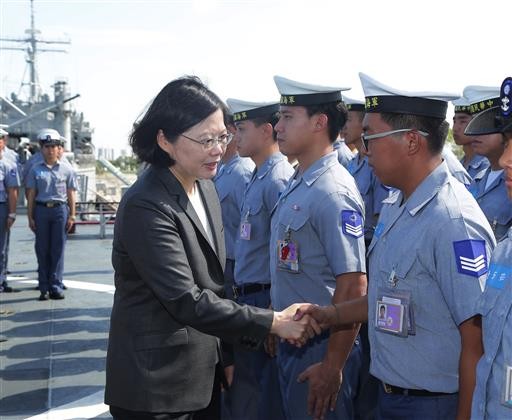Popular Reads
Top Results
Can't find what you're looking for?
View all search resultsPopular Reads
Top Results
Can't find what you're looking for?
View all search resultsChina threatens 'counterstrike' over US contact with Taiwan
Beijing says Taiwan is an inviolable part of China to be reclaimed, by force if necessary, and opposes any diplomatic recognition of the democratic island.
Change text size
Gift Premium Articles
to Anyone
C
hina on Monday threatened a "counterstrike" against a move by the United States to lift restrictions on official contacts with Taiwan as military tensions grow between Beijing and the self-ruled island.
US Secretary of State Mike Pompeo said Saturday Washington would lift "complex internal restrictions" on contacts with Taipei by diplomats, after a year of mounting US-Chinese friction on topics including human rights, trade and the origins of the COVID-19 pandemic.
Beijing says Taiwan is an inviolable part of China to be reclaimed, by force if necessary, and opposes any diplomatic recognition of the democratic island.
Chinese foreign ministry spokesman Zhao Lijian said Beijing "strongly condemns" the move and accused the United States of violating the terms of Washington's diplomatic relations with Beijing.
"Any action that harms China's core interests will receive a resolute counterstrike from China," Zhao warned, urging Pompeo to retract the decision or face "severe punishment".
It was not clear what the change means in practice, with Pompeo saying executive branch communications with Taiwan will be handled by the American Institute in Taiwan (AIT), which is owned by the US government and serves as the de facto embassy.
The AIT was founded in 1979, when the United States extended diplomatic recognition to mainland China under a historic agreement requiring it to end formal recognition of Taiwan.
But Washington remains a staunch ally of Taipei and is bound by Congress to sell it weapons for self-defense. It opposes any move to change Taiwan's current status by force.
Military tensions between mainland China and Taiwan have grown sharper in the past year -- reaching their worst since the mid-1990s, some analysts say.
Chinese jets made a record 380 incursions into Taiwan's defense zone last year, a military official said Tuesday.
Beijing's animosity has increased dramatically since Tsai Ing-wen won election as Taiwan's president in 2016 -- she rejects Beijing's insistence that the island is part of "one China".
Taiwan Foreign Minister Joseph Wu said on Monday that the United States move was a major boost for relations with the island's most important global backer.
"This is a big thing for the elevation of Taiwan-US relations," Wu told reporters, as quoted by Reuters, expressing his "sincere gratitude" to the US government. "Taiwan-US relations have been elevated to a global partnership. The foreign ministry will not let our guard down and hope to continue to boost the development of Taiwan-US ties."
Although the United States, like most countries, has no official ties with Taiwan, it is bound by law to provide it with the means to defend itself, and under President Donald Trump has ramped up arms sales and sent senior officials to Taipei.
On Wednesday, US ambassador to the United Nations, Kelly Craft, will arrive in Taipei for a three-day visit, which China has denounced.
Wu said both he and President Tsai would meet Craft on Thursday.
The topic for the visit is to discuss how to promote Taiwan's international participation, he added.
Craft's visit is highly symbolic, as Taiwan is not a member of the United Nations nor most global bodies because of China's objections. Beijing says only it has the right to speak for Taiwan on the international stage.
Taiwan says only its democratically elected government has this right.










